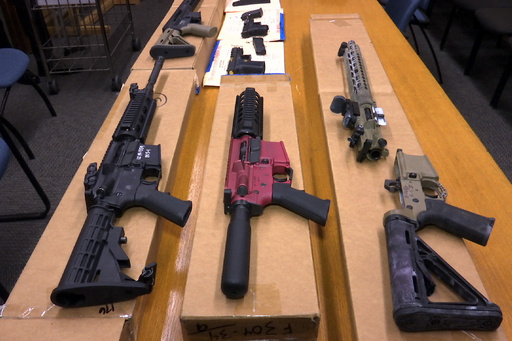RENO, Nev. (AP) — Nevada’s Supreme Court upheld a state ban on ghost guns Thursday, overturning a lower court’s ruling that sided with a gun manufacturer’s argument that the 2021 law regulating firearm components with no serial numbers was too broad and unconstitutionally vague.
Separately the court handed a setback to anti-abortion activists in a fight over a voter initiative that no longer was headed to the November ballot anyway, a decision that abortion rights’ advocates say nonetheless helps establish important legal guidelines regarding overall reproductive health care.
The gun law had previously been struck down by Lyon County District Judge John Schlegelmilch, who ruled in favor of a legal challenge by Nevada-based gun manufacturer Polymer80 Inc. that said the statute was too vague.
Among other things, Polymer80 argued, terms such as “blank,” “casting,” and “machined body” were not defined, while “unfinished frame or receiver” failed to specify what a “finished” frame or receiver is.
In upholding the statute, the Supreme Court said in a unanimous decision that the language that lawmakers approved and then-Gov. Steve Sisolak signed was “readily” understandable through ordinary usage and common understanding.
“The statutes here only regulate conduct involving an object that is intended to ultimately become a firearm,” Chief Justice Lydia Stiglich wrote in the ruling. “They prohibit acts involving such not-yet-complete firearms that have not been imprinted with a serial number. ”
She noted in the ruling that Polymer80’s “own legal counsel had written letters to the U.S. Bureau of Alcohol, Tobacco and Firearms that included the words ‘blank,’ ‘casting,’ and ‘machined’ in reference to its own products, showing that these terms are commonly understood.”
The fact that the terms were “generic and broad” does not make them vague, Stiglich added.
Nevada Attorney General Aaron Ford, a Democrat who filed the appeal on the state’s behalf in December 2021, said the ruling “is a win for public safety and creates sensible, practical measures to protect Nevadans from violent crime.”
“The ban on ‘ghost guns’ is one of the most impactful pieces of legislation that we have seen come through Carson City,” he said in a statement.
Polymer80’s legal counsel did not immediately respond to emails from The Associated Press seeking comment.
In the other decision Thursday, the high court rejected a Carson City judge’s ruling that the initiative’s description was misleading and violated requirements that it address a single subject by including abortion rights under the umbrella of reproductive health care.
“The medical procedures considered in the initiative petition concern reproduction. To assert that they could not all be addressed together because they are separate procedures is improper,” the Supreme Court said. “Each medical procedure relates to human reproduction and they are germane to each other and the initiative’s single subject of establishing a right to reproductive freedom.”
Abortion rights advocates hailed the decision even though they have already shifted their focus to a different and narrower initiative, which seeks to amend the state constitution and which they are are confident will make the November ballot after a judge ruled that it had met legal muster.
“Today’s ruling is an unequivocal recognition of what we’ve always know to be true: The right to reproductive freedom includes all aspects of a person’s reproductive health care,” Lindsey Harmon, president of Nevadans for Reproductive Freedom, said in a statement.
A lawyer representing a group that was fighting the voter initiative, the Coalition for Parents and Children, said expressed disappointment.
“The Court has transformed the single-subject rule into the single-category rule, which will open the floodgates to broad and deceptive initiative proposals like the one at issue in this case,” Jason Guinasso said via email. “My clients will now focus on educating the voters on why this proposal is bad law and policy for Nevadans.”
Harmon said her group has gathered more than 160,000 signatures for the new ballot initiative — well above the 102,000 required by June 26 — and intends to submit them for validation that month. The measure would enshrine in the constitution current protections under a 1990 law that guarantee access to abortion through 24 weeks of pregnancy, or later to protect the health of the pregnant person.
Voters would need to approve it in both 2024 and 2026 to change the constitution.


